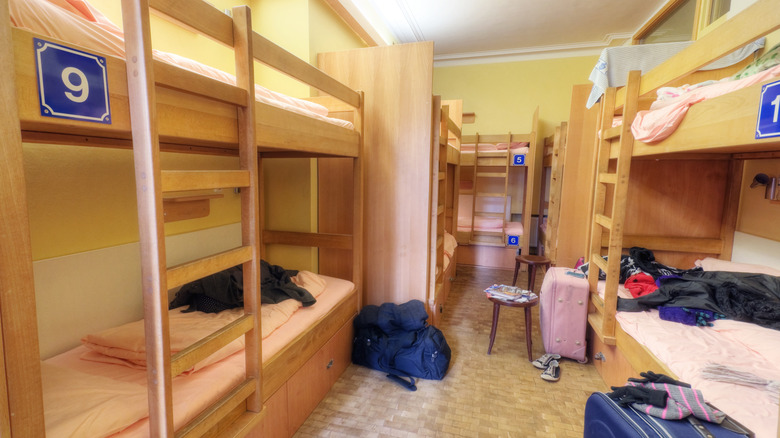Helpful Tips On The Best Way To Travel With Friends Of Different Incomes
Back in college, we were all poor. We had student loans up to our ears and fueled ourselves on instant ramen — maybe with some added Sriracha sauce when we were feeling fancy. Travel was easy because everyone was more or less in the same boat, financially speaking, so we pooled together pennies from our summer jobs and Federal Student Aid loans to go abroad. But then we graduated and got real jobs, and thus began the income insecurity.
The "rich" friend, "poor" friend dynamic has always been a perennially awkward one, a wealth gap capable of hewing any long-standing relationships in twain. The data bear this out; one survey concluded that money is the very, very last thing friends will discuss amongst themselves. Or take findings by Merrill Lynch and Age Wave, suggesting more than half of women would prefer to talk about their own death before divulging the state of their pocketbooks.
Planning a trip amongst old pals of varying financial situations is, understandably, precarious. There's a lot of potential for hurt feelings, misunderstandings, and awkward conversations about expenses. People can feel pressured, left out, or shamed when ends don't meet for that group reunion in Cancún. It doesn't have to be this way. Let's look at a few tips for making travel plans work when your salaries aren't quite in alignment.
Be inclusive
The number one tip here is to never assume and never exclude. It's a knee-jerk reaction to, after hearing whisperings of a friend's financial troubles, avoid embarrassing them by leaving them out of the travel conversation entirely. This is a surefire way to bruise even the most solid relationships when they accidentally learn about a trip in the offing — or worse, spot your beach photos on social media after the fact and ask for an explanation.
The solution? Always invite friends — finances be damned — regardless of where you're going or how long. Make it an open invitation without forcing their hand to commit or not. This gives them a graceful way to bow out without inviting questions about the number in their bank account. There's no need to investigate; people will think up the requisite excuses regardless of why they decide not to come, letting them save face in the process.
Be transparent
The worst possible thing for a person on a tight budget is an unexpected expense. In group planning situations, these are all too common. Everyone wants different things, so each person mentally plans their version of the trip — or makes plans with another friend. Then suddenly, the budget-focused person finds out everyone is renting jet skis for the morning, an expense that leaves them out.
Transparency needs to be the operative word from day one. Get the whole gang together, or start a group chat, and be brutally honest about every aspect of the trip. Are you going to fly in together? How long will you stay? What's the itinerary from day to day? Make sure you include the "maybes" on the docket, too, and the projected costs for them if plans change.
Account for emergencies, and figure out how you'll deal with contingencies that force you to throw out your plans altogether. The more open everyone is, the easier it will be to maximize your budget while traveling. This gives the person whose wallet is on a tight leash a chance to make their own plans for those travel vagaries.
Talk in terms of budget, not income
While we might be slowly chipping away at the foundations of the taboo on discussing finances, it's still very much a faux pas in Western culture to inquire about someone's earnings. Planning a trip, unfortunately, encourages questions of this forbidden nature. Change the paradigm by tweaking the vocabulary. Ask people what their anticipated budget is rather than awkwardly whispering behind their backs: "Can so-and-so afford it?"
Budgets are great because even those flush with cash can have a limited budget. There could be so many reasons behind a budget that financial insecurity won't necessarily be the first suspicion on everyone's mind. Someone might have just signed a mortgage or have a bigger family trip planned later in the year. If something on the checklist is too expensive, all a person needs to say is, "That's out of my budget," and that's that. No further discussion is required. Even so, you get a realistic, workable idea of what everyone can and cannot afford without economic squeamishness.
Assign a lead travel planner
Some people love planning, so much so that they get a thrill out of the prospect of designing a trip from beginning to end for their friend group. If you've got that type of friend, give them the reins — but while you're at it, have them craft the trip to be as budget-friendly as possible. Then, there's never any awkward discussion where any one friend has to keep clearing their throat and reminding everyone that they can't do XYZ activity, either.
This works best if the trip planner functions as a proxy to buy all the tickets, accommodations, and tours and then gives each group member their "bill." This creates some budget anonymity where each friend individually pays the planner their share. It also makes it possible (should higher-income friends so desire) to offset the cost of a lower-income friend's share by paying more, resulting in a smaller bill that's more manageable for them.
Generosity is okay, but keep it reasonable
There are plenty of tight-knit groups out there where everyone's willing to pitch in to make sure that one friend doesn't miss out on the big yearly reunion. On the one hand, this is great. It's a testament to how close you all are and ensures no one gets left out of the fun — after all, low wages and high inflation don't look to be changing anytime soon. If everyone's on board, then why not?
On the other hand, be cautious here. This can create an awkward power dynamic between someone with a higher income and someone who earns significantly less. Some people derive a great sense of pride from their ability to pay for themselves, so gifting them some or all of a vacation can be shameful and create a sense of financial impotence. Conversely, it can create pressure on friends who are flush to make up the difference, intensifying the suspicion many well-off individuals have that their lower-income friends just use them for money. Wherever you sit in this exchange, walk on eggshells.
Avoid IOUs like the plague
IOUs (an "I owe you" or an unpaid debt from lending money) are a battering ram to most friendships, as anyone who has lent money can attest to. Even borrowing a measly $20 creates a persistent sense of indebtedness and urgency, one that lingers in the room between the debtor and the lender until the debt is paid. Even afterward — and even if you did pay them back in full — it can create silent resentment if you took too long or that friend had to pester you about it. Friendships have ended in messy fallingouts for far, far less.
As much as is reasonably possible, don't lend money — nor borrow it — from friends, especially when it comes to costly trips. It's just not worth the drama it could potentially create. Helping someone out without the expectation of repayment is one thing (as mentioned in the previous tip), but bad feelings can stick around for years after an IOU. Leave lending to the banks.
Create flexible itineraries
It is important to plan a trip that's forgiving to the lowest budget, make no mistake, but there's no shame if one friend wants to do a more expensive activity — say, they want to swim with the pigs while planning a Caribbean vacation. On that same trip, someone else might prefer sitting on the beach for free. Rather than make the former the default planned group activity, provide extra options. While one group is island-hopping on a private boat, another could try their hands at surfing. Then, you reconvene later and dovetail your travel plans as if you were never apart. Varied plans make for great conversation when you regale each other about what the others missed.
In particular, create lower-cost or free alternatives to all the plans that require money. Regardless of where you are in the world, there are a ton of cheap or free things you can do. Never make the mistake of assuming good memories need money to create them. As the Ray Henderson song goes, "The best things in life are free."
Account for independent traveling
Following off the previous point, it's key that your plans give space for independent traveling — that is when the group "parts ways" to go off and do their own thing. This is a rock-solid solution to avoid compromises and allot everyone a few hours of breathing space to do what they will. Think of this as an "escape hatch," so friends who feel boxed in by expensive — or undesirable — travel plans have a way out. It's time they can use as they please, whether to take a nap or do that thing that no one else wants to.
As a general principle, it's a good idea to include plenty of free time when group traveling. People get tired and need a moment or two alone. The last thing you want is an argument brought on by weary, hangry travelers. A few breaths apart helps to reset and recharge everyone for another day of fun-filled traveling together and gives space for those whose budgets cannot cope.
Split costs in a way that makes sense
Splitting costs makes sense for things of equal value, like airplane tickets of the same class booked as a group, shared hotel accommodations, and anything where per-person prices would be identical. In other situations, such as a group dinner at a restaurant, splitting is nonsensical. Why should the person who filled up on free garlic bread subsidize another's fresh lobster? Adopt a "pay for what you get" rule and don't do bill splitting for unequal costs; as with avoiding IOUs, it prevents arguments and hard feelings.
Go a step further and make sure everyone knows they're equal with splitting apps, such as Splitwise. This lets you break up a payment among friends, showing clearly how much each person is responsible for and holding them accountable for paying it. If struggling budgets are preventing certain friends from traveling, then consider splitting the overall cost by category. In other words, one higher-income friend handles the flights, one handles the accommodations, and others who don't earn as much split other expenses. This method still feels fair, like people are pulling their own weight, even if some spent less than others.
Try a you pick, you pay approach
Maybe there's one friend who's absolutely dying to watch the sunset over San Diego Bay on a sailboat, but no one else is quite as gung ho — and, more to the point, able to cough up enough dough. Assuming they've got the cash to spare, they could (if they're fully onboard, no pun intended) treat everyone else by paying for the whole thing. It lets the friend in question get their dream sunset sail tour, and those whose budgets are less accommodating enjoy something they might not have been able to afford.
Of course, we recommend trying this out mostly for things that are on the smaller side, such as food and drink stops. If you do try out this strategy, though, it creates a sense of fairness — similar to how you wouldn't feel indebted if a friend invited you over for dinner. If you pick, you pay. Simple.
Don't go into debt for your friends
Do you have that one extravagant friend who throws around money like they're Jordan Belfort in "The Wolf of Wall Street?" One whose opulent weekend escapades are the bane of your credit card statement? You're not alone. 88% of millennials end up in some kind of debt because of that kind of friend, according to CreditKarma.
National Debt Relief reiterates that one of the most common reasons people stay in debt is out-of-control credit card spending. Despite this, many get locked into a FOMO mentality around their friends and a fear that they need to spend to "keep up with the Joneses," as it were. Anyone who's been in debt knows that it feels like bailing out a boat that's taking on more water than you can dump back out.
You can probably see where this is going. If your friends are planning a bombastic vacation (or successive, too-frequent vacations) that might require a second mortgage, just skip out on the trip — whether they can afford that trip themselves or not. This might be prime time for a heart-to-heart conversation on money habits, just so that you avoid the impression that you're flaking out for other reasons.
Grab group discounts
Always look for group discounts. Yes, they do still exist, even if industry leaders like Groupon have veered more toward general discounts than things people can do together. Said discounts are most common when it comes to informal, off-the-books prices you would negotiate, such as hiring a private driver or a tour guide. Travel agents can work to secure private deals directly that net you more advantageous discounts than if you were to book the conventional way.
You can still find group discounts in a number of other ways on your own. Airlines sometimes offer up to 10% off provided you have a large enough group — say, 10 people or more. The same may apply to hotels as long as you book a certain number of rooms. That said, many of these discounts are the sort you would get by haggling with airlines and hotel chains directly via their hotlines — though keep in mind that you may be on the hook for non-refundable deposits and minimum stay requirements. Some businesses may give you further discounts if you categorize your trip as a retreat or a special event of some kind. It never hurts to ask, and the worst that can happen is the request is denied.
Cook your meals together
It doesn't take an accountant wunderkind to understand that eating out will always be more expensive than cooking at home. Getting a decent burger in a restaurant costs exponentially more than if you'd made it with your own two hands. Now multiply that by a dozen people and add a 20% gratuity. Goodbye, budget.
Look, we get it. No one likes the idea of cooking for themselves on a vacation. You're away from home and all your beloved cooking implements, so, you reason, you have a good excuse for racking up a ton of restaurant charges. For friends with varying incomes, though, this can quickly become a pain point. One man's McDonalds is another man's Guy Savoy.
Instead, take a trip to a local grocery store and buy enough to make a few meals — or all of them for your trip's duration. Plenty of vacation rentals and Airbnbs come with fully functional kitchens. There's a good chance at least one of your friends is a maestro behind the saucepan, so you won't have to subsist on rice and salt. Plus, it doubles as an unforgettable group activity. Cooking together strengthens bonds and is arguably far more exciting than sitting around in a cramped, crowded restaurant where the food could be a total — and expensive — bust.
Consider point sharing
Credit cards are a no-brainer for the avid traveler, provided you've got a firm hand on excess spending. You accumulate points for any purchases you make, and those points convert into, effectively, free money when you redeem eligible purchases. Unless you've been institutionalized for uncontrollable spending, it's hard not to recommend a card that covers travel purchases.
One technique some friends have tried out is "point sharing." This is where you "gift" a vacation to a friend using your credit card points. Or, you subsidize a portion of the getaway and let them pay the remainder. It's a no-cost, minimum-guilt way to help a friend enjoy a vacation they can't afford. Some people have more points than they know what to do with, so it's better to put them to use than let them gather dust.
You can do the same with points for airlines and hotels. The only downside is that you can't literally gift your points to them. You'd need to make the purchase in their name and have them transfer you the difference.
Book hostels
Your perspective on a hostel will vary wildly from that of the next person. For some, hostels are strictly the domain of backpackers headed across Europe with only a small wad of euros in their pockets. For others, they're a fun way to mingle with fellow travelers. And for the paranoid, they're a place rife with crime or an ideal setting for a horror movie. One thing they are, without a doubt, is cheap. There are some incredible hostels to stay in around the world, many costing less than $50 per night per person. If you can hold your nose at the idea of sleeping in the same room as some strangers, this is a bargain of an idea.
Many hostels offer cozy common areas perfect for enjoying your morning coffee or reading a book before turning in for the night. Some include great amenities such as pools, gyms, and restaurants, things that would make the average hotel skyrocket in price. Many even have chill backpacker bars for drinks and conversation. Plus, the floorplan of many hostels could allow your group to get a room to itself, one with a lock and key so you can leave your belongings behind safely when you go out for the day. There's also a good chance you'll run into budget-conscious people with their own travel secrets to share — ones that will save your group even more money.















